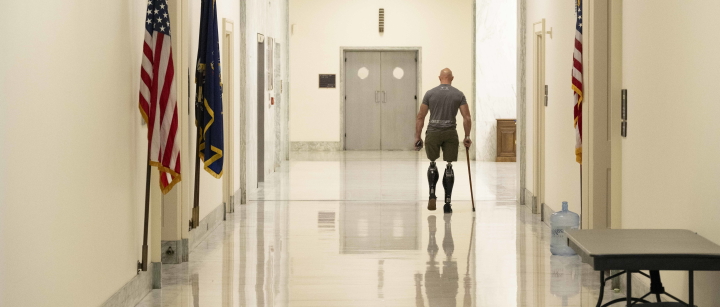Listen to the article
Veterans Affairs Bylaw Update Sparks Controversy, but Department Maintains No Impact on Patient Care
Recent changes to the Department of Veterans Affairs bylaws have sparked concerns and confusion after the removal of specific language prohibiting discrimination based on “national origin, politics, marital status” and other characteristics.
The VA confirms these modifications were made to align with recent executive orders but insists they will not affect patient care or employment practices.
“These updates will have no impact whatsoever on who VA treats or employs,” a department spokesperson stated in an email response to inquiries about the changes.
The controversy emerged when observers noticed differences between the April 2024 version of the VA’s Palo Alto Health Care System bylaws and the archived 2023 document. The earlier version explicitly prohibited staff from discriminating “on the basis of race, age, color, sex, religion, national origin, politics, marital status, or disability” in employment matters or in providing veterans’ benefits.
The updated document removes several specific protections—including “national origin, politics, marital status,” “age,” and “disability”—replacing them with broader language about “any legally protected status.” The new wording prohibits discrimination “on the basis of any legally protected status, including legally protected status such as race, color, religion, sex, or prior protected activity.”
MedPage Today first reported these changes, which were subsequently covered by The Guardian in an article initially suggesting VA doctors could refuse to treat Democrats or unmarried veterans. The Guardian later amended its story after the VA contacted them to clarify its position.
According to the VA spokesperson, the bylaw modifications were made specifically to comply with President Trump’s January 20 executive order titled “Defending Women From Gender Ideology Extremism And Restoring Biological Truth To The Federal Government.” This is the same executive order cited by the VA in March when it rescinded its directive on “respectful delivery of health care” for transgender veterans—a policy that had been in place since 2018, during Trump’s first administration.
The VA has emphatically denied that these changes would permit discrimination, stating: “Under no circumstances whatsoever would VA ever deny appropriate care to any eligible Veterans or appropriate employment to any qualified potential employees.” The spokesperson further clarified that the VA would never “allow any employees to refuse to provide appropriate care to any eligible Veterans or appropriate employment to any qualified potential employees.”
When asked about existing protections that would prevent discrimination based on the removed categories, the VA cited Title 38 of the U.S. Code, specifically sections 1705 and 1710, which govern veterans’ healthcare eligibility. These sections establish priorities for VA healthcare access based primarily on service-connected disabilities.
The department also pointed to a 2013 VA directive titled “Nondiscrimination in Federally-Conducted and Federally-Assisted (External) Programs.” This directive explicitly prohibits discrimination based on numerous characteristics including “race, color, religion, national origin, Limited English Proficiency, age, sex (includes gender identity and transgender status), sexual orientation, pregnancy, marital and parental status, political affiliation, disability, genetic information, harassment, or retaliation.”
The directive remains in effect and would theoretically protect veterans from discrimination on the grounds no longer explicitly mentioned in the bylaws.
Veterans’ advocacy groups have not yet issued formal responses to these changes, but the controversy highlights the ongoing tensions surrounding healthcare access and anti-discrimination protections within federal agencies during the current administration.
The VA serves approximately 9 million veterans annually through its healthcare system, making it the largest integrated healthcare network in the United States. Any changes to its policies can have far-reaching implications for veteran communities nationwide.
Fact Checker
Verify the accuracy of this article using The Disinformation Commission analysis and real-time sources.




9 Comments
While the VA claims these changes won’t affect patient care, the removal of certain protected categories is puzzling. Discrimination in any form should have no place in a healthcare system serving our veterans.
Absolutely. The VA must ensure its policies and practices uphold the highest standards of non-discrimination and equal treatment for all patients and staff.
This is an unsettling development that merits close scrutiny. Removing anti-discrimination language, even if the intent is to align with other orders, could open the door to potential bias and unfair treatment. The VA needs to provide clear justification and guarantees.
This is an important issue that deserves close scrutiny. Updating bylaws to align with recent orders is understandable, but the removal of specific protections is concerning. I hope the VA can clarify how this will impact patient care and employment practices.
Agreed, the lack of explicit language prohibiting discrimination is worrying. The VA needs to be fully transparent about the reasoning and implications of these bylaw changes.
This seems like a concerning development that could undermine the VA’s commitment to equitable and inclusive care for our veterans. I hope the department can provide clear justification for these bylaw changes and detailed plans to maintain robust anti-discrimination protections.
The VA’s claim that this will have no impact on patient care or employment practices is hard to believe. Removing explicit anti-discrimination language is worrying and raises red flags. The department must provide a convincing explanation and assurances.
Agreed. The VA needs to be fully transparent about the reasoning behind these bylaw changes and how they will ensure non-discrimination is upheld in practice.
I’m curious to understand the VA’s rationale for these bylaw changes. While alignment with recent orders is understandable, the optics of removing specific discrimination protections are concerning. Transparency and robust safeguards are essential for a healthcare system serving our veterans.